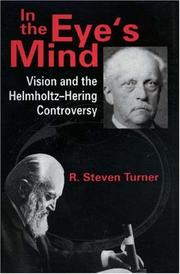| Listing 1 - 10 of 14 | << page >> |
Sort by
|
Book
Abstract | Keywords | Export | Availability | Bookmark
 Loading...
Loading...Choose an application
- Reference Manager
- EndNote
- RefWorks (Direct export to RefWorks)
Senses and sensation. --- Perception. --- Helmholtz, Hermann von,
Dissertation
Year: 1943 Publisher: Paris : Gauthier-Villars,
Abstract | Keywords | Export | Availability | Bookmark
 Loading...
Loading...Choose an application
- Reference Manager
- EndNote
- RefWorks (Direct export to RefWorks)
Hydrodynamics. --- Helmholtz, Hermann von, --- Kirchhoff, Gustav Robert,
Book
ISBN: 3770546989 3825230341 3825240983 9783770546985 9783825230340 9783825240981 3770546059 3825230082 9783770546053 9783825230081 3770547357 3825230449 9783770547357 9783825230449 Year: 2009 Publisher: Stuttgart : Fink,
Abstract | Keywords | Export | Availability | Bookmark
 Loading...
Loading...Choose an application
- Reference Manager
- EndNote
- RefWorks (Direct export to RefWorks)
Biophysics. --- Biophysik. --- Physicians --- Physics --- Physiology. --- Science. --- Helmholtz, Hermann von, --- Helmholtz, Hermann von. --- Psychoanalysis --- Freud, Sigmund, --- Freud, Sigmund. --- Actor-Network-Theory. --- Latour, Bruno --- Latour, Bruno.
Book
ISBN: 0262014483 0262518198 026231195X 9786612899270 0262289644 1282899279 9780262289641 9780262290388 0262290383 9781282899278 9780262014489 9780262518192 Year: 2010 Publisher: Cambridge, MA ; London Mit Press
Abstract | Keywords | Export | Availability | Bookmark
 Loading...
Loading...Choose an application
- Reference Manager
- EndNote
- RefWorks (Direct export to RefWorks)
"Although Hermann von Helmholtz was one of the most remarkable figures of nineteenth-century science, he is little known outside his native Germany. Helmholtz (1821-1894) made significant contributions to the study of vision and perception and was also influential in the painting, music, and literature of the time; one of his major works analyzed tone in music. This book, the first in English to describe Helmholtz's life and work in detail, describes his scientific studies, analyzes them in the context of the science and philosophy of the period---in particular the German Naturphilosophie---and gauges his influence on today's neuroscience." "Helmholtz, trained by Johannes Muller, one of the best physiologists of his time, used a resolutely materialistic and empirical scientific method in his research. This puts him in the tradition of Kant and the English empirical philosophers and directly opposed to the idealists and naturalists who interpreted nature based on metaphysical presuppositions. Helmholtz's research on color vision put him at odds with Goethe's more romantic theorizing on the subject; but at the end of his life, Helmholtz honored Goethe's contributions, acknowledging that artistic intuition could reveal truths about the human mind that are inaccessible to science." "Helmholtz's work, eclipsed at the beginning of the twentieth century by new ideas in neurophysiology, has recently been rediscovered. We can now recognize in Helmholtz's methods---which were based on his belief in the interconnectedness of physiology and psychology---the origins of neuroscience."--Jacket.
Book
ISBN: 9783662355145 9783662363423 Year: 1921 Publisher: Berlin : Julius Springer,
Abstract | Keywords | Export | Availability | Bookmark
 Loading...
Loading...Choose an application
- Reference Manager
- EndNote
- RefWorks (Direct export to RefWorks)
Erkenntnistheorie. --- Knowledge, Theory of. --- Naturwissenschaften. --- Sinnesphysiologie. --- Wahrnehmung. --- Helmholtz, Hermann von. --- Helmholtz, Herman von,

ISBN: 9780226326597 0226326594 0226326586 Year: 1995 Publisher: Chicago London University of Chicago Press
Abstract | Keywords | Export | Availability | Bookmark
 Loading...
Loading...Choose an application
- Reference Manager
- EndNote
- RefWorks (Direct export to RefWorks)
Naturwissenschaften. --- Natuurwetenschappen. --- Philosophie des sciences --- Philosophy. --- Science --- Sciences --- Wetenschapsfilosofie. --- Wissenschaftsphilosophie. --- Philosophy --- History --- Social aspects --- Social aspects. --- Sociology. --- Aspect social --- Helmholtz, Hermann von, --- Helmholtz, Hermann von. --- Helmoltz, Hermann von, --- 1800-1899. --- 19th century
Book
ISBN: 022653135X 022653149X Publisher: University of Chicago Press
Abstract | Keywords | Export | Availability | Bookmark
 Loading...
Loading...Choose an application
- Reference Manager
- EndNote
- RefWorks (Direct export to RefWorks)
On January 5, 1845, the Prussian cultural minister received a request by a group of six young men to form a new Physical Society in Berlin. In fields from thermodynamics, mechanics, and electromagnetism to animal electricity, ophthalmology, and psychophysics, members of this small but growing group—which soon included Emil Du Bois-Reymond, Ernst Brücke, Werner Siemens, and Hermann von Helmholtz—established leading positions in what only thirty years later had become a new landscape of natural science. How was this possible? How could a bunch of twenty-somethings succeed in seizing the future? In Aesthetics, Industry, and Science M. Norton Wise answers these questions not simply from a technical perspective of theories and practices but with a broader cultural view of what was happening in Berlin at the time. He emphasizes in particular how rapid industrial development, military modernization, and the neoclassical aesthetics of contemporary art informed the ways in which these young men thought. Wise argues that aesthetic sensibility and material aspiration in this period were intimately linked, and he uses these two themes for a final reappraisal of Helmholtz’s early work. Anyone interested in modern German cultural history, or the history of nineteenth-century German science, will be drawn to this landmark book.
Science --- History --- Helmholtz, Hermann von, --- Physikalische Gesellschaft zu Berlin. --- Berlin Physical Society. --- Helmholtz. --- aesthetics. --- cultural history. --- history of science. --- industry. --- nineteenth century.

ISBN: 1282716727 9786612716720 3110217201 9783110217209 9781282716728 9783110183917 3110183919 311048157X Year: 2009 Publisher: Berlin New York Walter de Gruyter
Abstract | Keywords | Export | Availability | Bookmark
 Loading...
Loading...Choose an application
- Reference Manager
- EndNote
- RefWorks (Direct export to RefWorks)
This book offers a new interpretation of Hermann von Helmholtz's work on the epistemology of geometry. A detailed analysis of the philosophical arguments of Helmholtz's Erhaltung der Kraft shows that he took physical theories to be constrained by a regulative ideal. They must render nature "completely comprehensible", which implies that all physical magnitudes must be relations among empirically given phenomena. This conviction eventually forced Helmholtz to explain how geometry itself could be so construed. Hyder shows how Helmholtz answered this question by drawing on the theory of magnitudes developed in his research on the colour-space. He argues against the dominant interpretation of Helmholtz's work by suggesting that for the latter, it is less the inductive character of geometry that makes it empirical, and rather the regulative requirement that the system of natural science be empirically closed.
Geometry --- Mathematics --- Euclid's Elements --- Philosophy. --- Kant, Immanuel, --- Helmholtz, Hermann von, --- Gelʹmgolʹt︠s︡, German Li︠u︡dvig Ferdinand, --- Von Helmholtz, Hermann, --- Helmholtz, H. --- Gelʹmgolʹtt︠s︡, German fon-, --- Fon-Gelʹmgolʹtt︠s︡, German, --- Helmholtz, Hermann Ludwig Ferdinand von, --- Helmholtz, Herman L. F., --- Kant, Immanuel --- Kant, I. --- Kānt, ʻAmmānūʼīl, --- Kant, Immanouel, --- Kant, Immanuil, --- Kʻantʻŭ, --- Kant, --- Kant, Emmanuel, --- Ḳanṭ, ʻImanuʼel, --- Kant, E., --- Kant, Emanuel, --- Cantơ, I., --- Kant, Emanuele, --- Kant, Im. --- קאנט --- קאנט, א. --- קאנט, עמנואל --- קאנט, עמנואל, --- קאנט, ע. --- קנט --- קנט, עמנואל --- קנט, עמנואל, --- كانت ، ايمانوئل --- كنت، إمانويل، --- カントイマニユエル, --- Kangde, --- 康德, --- Kanṭ, Īmānwīl, --- كانط، إيمانويل --- Kant, Manuel, --- Helmholtz, Hermann von. --- Kant, Immanuel. --- philosophy of science.
Book
ISBN: 9781139516785 1139516787 9781139057745 113905774X 9781139518642 113951864X 9781107015173 1107015170 1107230128 9781107230125 1139508091 9781139508094 1283521741 9781283521741 1139517716 9781139517713 9786613834195 661383419X 1139515136 9781139515139 1139514210 9781139514217 9781107504332 1107504333 Year: 2012 Publisher: Cambridge ; New York : Cambridge University Press,
Abstract | Keywords | Export | Availability | Bookmark
 Loading...
Loading...Choose an application
- Reference Manager
- EndNote
- RefWorks (Direct export to RefWorks)
The musical writings of scientist Hermann von Helmholtz (1821-94) have long been considered epoch-making in the histories of both science and aesthetics. Widely regarded as having promised an authoritative scientific foundation for harmonic practice, Helmholtz can also be read as posing a series of persistent challenges to our understanding of the musical listener. Helmholtz was at the forefront of sweeping changes in discourse about human perception. His interrogation of the physiology of hearing threw notions of the self-possessed listener into doubt and conjured a sense of vulnerability to mechanistic forces and fragmentary experience. Yet this new image of the listener was simultaneously caught up in wider projects of discipline, education and liberal reform. Reading Helmholtz in conjunction with a range of his intellectual sources and heirs, from Goethe to Max Weber to George Bernard Shaw, Steege explores the significance of Helmholtz's listener as an emblem of a broader cultural modernity.
Music --- Musical acoustics --- Physics --- Sound --- Monochord --- Music physiology --- Physiological aspects of music --- Music psychology --- Psychological aspects. --- Physiological aspects. --- Acoustics and physics. --- Psychology --- Helmholtz, Hermann von, --- Gelʹmgolʹt︠s︡, German Li︠u︡dvig Ferdinand, --- Von Helmholtz, Hermann, --- Helmholtz, H. --- Gelʹmgolʹtt︠s︡, German fon-, --- Fon-Gelʹmgolʹtt︠s︡, German, --- Helmholtz, Hermann Ludwig Ferdinand von, --- Helmholtz, Herman L. F.,

ISBN: 0691033978 1306984785 069160276X 1400863813 9781400863815 9780691033976 9780691602769 Year: 1994 Publisher: Princeton, N. J. Princeton University Press
Abstract | Keywords | Export | Availability | Bookmark
 Loading...
Loading...Choose an application
- Reference Manager
- EndNote
- RefWorks (Direct export to RefWorks)
One of the most persistent controversies of modern science has dealt with human visual perception. It erupted in Germany during the 1860s as a dispute between physiologists Hermann von Helmholtz, Ewald Hering, and their schools. Well into the twentieth century these groups warred over the origins of our capacity to perceive space, over the retinal mechanisms that mediate color sensations, and over the role of mind, experience, and inference in vision. Here R. Steven Turner explores the impassioned exchanges of those rival schools, both to illuminate the clash of theory and to explore the larger role of controversy in the development of science. Controversy, he suggests, is constitutive of scientific change, and he uses the Helmholtz-Hering dispute to illustrate how polemics and tacit negotiation shape evolving theoretical stances.Turner focuses on the arguments and issues of the dispute, issues that ranged from the interpretation of color blindness and optical illusions to the therapeutic practices of clinical ophthalmology. As well, he focuses on the personalities, institutions, disciplinary structures, and methodological commitments that shaped the dispute, including the schools' rhetorical strategies. He explores the incommensurability of the protagonists' viewpoints and examines the reception of the theories and the changing fortunes of the schools. Finally, Turner traces the controversy into the twentieth century, where the issues continue to inform the study of vision today.Originally published in 1994.The Princeton Legacy Library uses the latest print-on-demand technology to again make available previously out-of-print books from the distinguished backlist of Princeton University Press. These editions preserve the original texts of these important books while presenting them in durable paperback and hardcover editions. The goal of the Princeton Legacy Library is to vastly increase access to the rich scholarly heritage found in the thousands of books published by Princeton University Press since its founding in 1905.
Visual perception --- Research --- Vision --- Visual Perception. --- History --- 19th century. --- history. --- physiology. --- -Optics, Psychological --- Perception --- Visual discrimination --- -19th century --- Psychological aspects --- Helmholtz, Hermann von --- Hering, Ewald --- -History --- History. --- Physiology. --- Helmholtz, Hermann von, --- Hering, Ewald, --- Optics, Psychological --- Hering, E. --- Hering, Karl Ewald Konstantin, --- Gelʹmgolʹt︠s︡, German Li︠u︡dvig Ferdinand, --- Von Helmholtz, Hermann, --- Helmholtz, H. --- Gelʹmgolʹtt︠s︡, German fon-, --- Fon-Gelʹmgolʹtt︠s︡, German, --- Helmholtz, Hermann Ludwig Ferdinand von, --- Helmholtz, Herman L. F., --- Perception, Visual --- Perceptions, Visual --- Visual Perceptions --- Vision, Ocular --- Light Signal Transduction, Visual --- Ocular Vision --- Visual Light Signal Transduction --- Visual Phototransduction --- Visual Transduction --- Phototransduction, Visual --- Transduction, Visual --- Eye --- Ophthalmology --- Visual Perception --- 19th century --- Visual perception - History - 19th century. --- History&delete& --- Eyesight --- Seeing --- Sight --- Senses and sensation --- Blindfolds --- Physiological optics
| Listing 1 - 10 of 14 | << page >> |
Sort by
|

 Search
Search Feedback
Feedback About UniCat
About UniCat  Help
Help News
News